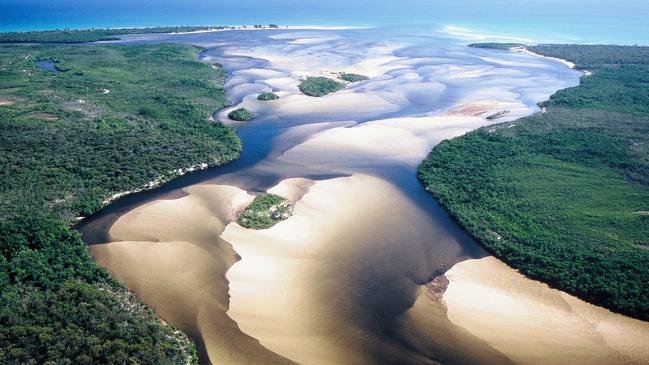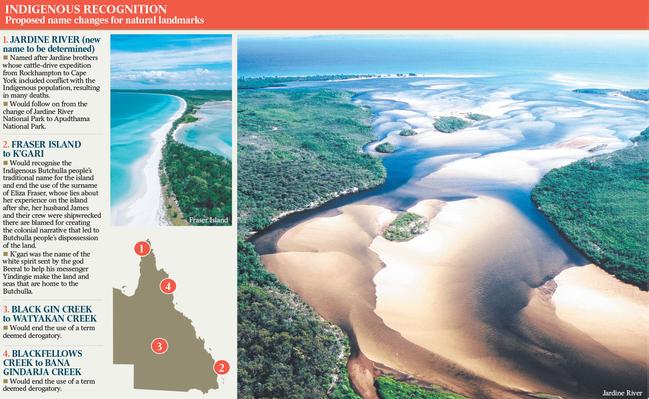‘Offensive’ names wiped from the map in Queensland
Racist and derogatory place names in Queensland, and those honouring brutal settlers, will be replaced by traditional names in First Nations languages.

Racist and derogatory place names in Queensland, and those honouring brutal settlers, will be replaced by traditional names in First Nations languages, as part of the state’s truth-telling and treaty process.
There are moves already under way to formally restore Fraser Island’s traditional name, K’gari meaning “paradise”, and rename Black Gin Creek, near Longreach, and Blackfellows Creek, near Cairns, as well as a fresh push to rename the Jardine River on Cape York.
Treaty Advancement Committee co-chair Mick Gooda said Queensland’s treaty truth-telling process, which is due to start next year, would work to restore original names of places, but it was important to retain some as reminders of historical wrongdoing.
Mr Gooda, a Ghungalu man from central Queensland, said while he wouldn’t support the changing of Brisbane’s Boundary Streets (which denoted the line Indigenous people were punished for crossing at night and on Sundays), others should be changed or restored.
“An outcome of truth-telling will be to change names, and go back to the original names. I wouldn’t change a Boundary Street because it reminds people of certain things … but there are things that are offensive.
“Black Gin Creek’s pretty offensive, and Mount Wheeler outside Rockhampton was named after a guy that killed lots of people and led massacres. And there’s … just recognising Aboriginal culture, like K’gari.”
Fraser Island is named after Scottish shipwreck survivor Eliza Fraser, who lived only because of the help of the Butchulla people of the island. But she later falsely claimed she had been captured, called it a “fate worse than death”, and described the Butchulla people as primitive and barbaric.
Butchulla Aboriginal Corporation general manager Chantel Van Wamelen said that after Eliza Fraser’s lies were published, the traditional owners were forced into missions on the island, and then separated from their children and removed to the settlements of Cherbourg and Yarrabah.

“K’gari means paradise, and it’s the name we’ve always called the island,” Ms Van Wamelen said. “Why would we want it to be named after Eliza Fraser, when her words started the stolen generation for our people? Through truth-telling, people need to understand the history and what did happen, even if it is sometimes uncomfortable.”
Consultation on changing the island’s name back to K’gari finishes next month. Consultation on the renaming of the two creeks ends on Friday. Black Gin Creek will be called Watyakan, meaning Women’s Creek, and Blackfellows Creek will be called Bana Gindarja Creek, meaning water cassowary. There are still more than a dozen creeks with the words “black gin” in their names across Queensland.
This week, the state government handed back 362,000ha of Cape York land to traditional owners, including the Jardine River National Park, which has been renamed Apudthama National Park.
The Jardine family were brutal early white settlers of the peninsula, and brothers Frank and Alick Jardine killed Aboriginal people as they made a 10-month trek driving cattle from central Queensland to the tip of mainland Australia in the 1860s.
Sandra Woosup, whose Angkamuthi country is traversed by the Jardine River, said the watercourse should be called by its traditional names, depending on which clan group’s country the river flowed through.
“The Jardines put their names on some areas, but we had our language name on our places forever,” Ms Woosup said.
“They had the government behind them, they had the power, there was nothing we could do about it then. We can’t remove the past hurt, but we can work together for a better future.”
Environment Minister Meaghan Scanlon backed the restoration of traditional names, and the removal of names associated with “hurt and a history of dispossession”. “Jardine and Fraser are examples of that,” Ms Scanlon said. Resources Minister Scott Stewart said his department – which administers place names – was receiving more proposals for change. In 2017, the state discontinued the name of 10 north Queensland locations that had the n-word in their titles. They were not renamed.




To join the conversation, please log in. Don't have an account? Register
Join the conversation, you are commenting as Logout